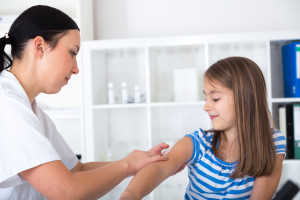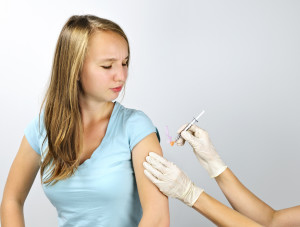 As a parent, HPV can be a scary concept. No one wants to discuss cancer with their pre-teens, but research shows that children should receive the HPV vaccination as early as 11 years old. HPV refers to the sexually transmitted infection (STI) called human papillomavirus (HPV). As the most common STI, more than 100 variations of HPV exist. Some people with HPV never experience symptoms and the virus may go away on its own within a couple years. However, HPV can also lead to genital warts and cancer, with the Center for Disease Control and Prevention (CDC) reporting more than 32,000 cases of HPV-related cancers each year.
As a parent, HPV can be a scary concept. No one wants to discuss cancer with their pre-teens, but research shows that children should receive the HPV vaccination as early as 11 years old. HPV refers to the sexually transmitted infection (STI) called human papillomavirus (HPV). As the most common STI, more than 100 variations of HPV exist. Some people with HPV never experience symptoms and the virus may go away on its own within a couple years. However, HPV can also lead to genital warts and cancer, with the Center for Disease Control and Prevention (CDC) reporting more than 32,000 cases of HPV-related cancers each year.
So, you may be wondering, how is HPV contracted? As an STI, the HPV virus is contracted through skin-to-skin contact, even if intercourse does not take place. Genital contact to the mouth, anus, and vagina can result in contraction of HPV.
According to the CDC, “HPV is a very common virus; nearly 80 million people—about one in four—are currently infected in the United States.” Upward of 14 million people, including teens, will contract the virus each year. HPV affects both men and woman and can cause the following cancers: cervix, vagina, vulva, penis, anus and throat. In addition to the 32,000-plus cases of cervical cancer, the CDC reports, “Every year in the United States, nearly 500,000 women are diagnosed with low grade cervical pre-cancers, and more than 200,000 women are diagnosed with high grade cervical lesions.”
Thanks to advances in medicine, a vaccination can help stop HPV by protecting against cancers caused by the HPV infection. The CDC recommends that all children, male and female, be vaccinated at age 11 or 12. In adolescents, two doses are needed six months apart. Teens over 14 years will need three doses over six months. All woman under 26 and all men under 21 should receive updates to the vaccination as they grow older. Additionally, the LGBTQ community should also receive the vaccination.
In addition to the vaccination, what else can be done to protect children? Talk with your teens, even if you don’t suspect they are engaging in sexual relationships. While these conversations can be tough at the time, remember that your child’s long-term health is paramount. It’s better to have the conversation early, rather than waiting until they are sexually active. Additionally, speak to your teens about proper condom use and monogamous relationships. Lastly, encourage sexually active adults, aged 21 to 65, to receive regular cervical cancer screenings from their doctor.
Sources:
https://www.cdc.gov/hpv/parents/vaccine.html
https://www.plannedparenthood.org/learn/stds-hiv-safer-sex/hpv
More
 The human papillomavirus (HPV) is a group of more than 150 related viruses newly infecting approximately 14 million people each year. It is estimated that about 79 million Americans are currently infected with HPV. With numbers this staggering, it is important to understand the risks associated with HPV, and how to keep you and your children safe from infection. The HPV vaccine has been proven to protect young people from the virus’ risks and side effects, however as with all preventive treatments, parents should be thoroughly informed about the vaccine and its risks before choosing to vaccinate their children. Read on for everything you need to know about the HPV vaccine.
The human papillomavirus (HPV) is a group of more than 150 related viruses newly infecting approximately 14 million people each year. It is estimated that about 79 million Americans are currently infected with HPV. With numbers this staggering, it is important to understand the risks associated with HPV, and how to keep you and your children safe from infection. The HPV vaccine has been proven to protect young people from the virus’ risks and side effects, however as with all preventive treatments, parents should be thoroughly informed about the vaccine and its risks before choosing to vaccinate their children. Read on for everything you need to know about the HPV vaccine.
Contracting HPV
HPV is transmitted through skin-to-skin sexual contact, making it the most common sexually transmitted infection. In rare cases, pregnant women can pass HPV to their babies during delivery. In these cases, the baby is at risk of developing recurrent respiratory papillomatosis (RRP), a condition where warts grow in the throat.
HPV Symptoms
Many who contract HPV never demonstrate symptoms—making it easier for them to transmit the disease unknowingly. 90 percent of HPV infections go away on their own within two years. Still, those diagnosed with the virus are at risk of developing genital warts, and in the most severe cases, cancer, including cervical, vaginal, vulvar, penile, anal, and throat cancer. The HPV vaccine protects against the development of HPV-related symptoms, as well as cancers.
Who Should Receive the Vaccine
The best time to administer the vaccine, for optimal effectiveness, is around ages 11 and 12 before boys and girls are sexually active. The vaccine also produces a more effective immune response when administered to preteens, making it even more important to vaccinate your children before they become teenagers.
Young adults who did not receive the vaccine before age 12 can still be effectively vaccinated, even if they have already had sex. Young women can be vaccinated up to age 26, and young men can be vaccinated up to age 21. Young men who have sex with other men or who have weakened immune systems, including those who are HIV positive, can be vaccinated up to age 26.
Vaccine Administration
The vaccine is administered in three shots. The second must be given one to two months after the first, and the third must be given six months after the first. Individuals who wait longer than is recommended between shots are still encouraged to finish the series. There is no need to restart the shot series for best results. Research shows that those who receive the entire series are protected for a period of 8-10 years.
Vaccine Effectiveness
Clinical trials have shown that the vaccine provides almost 100 percent protection against precancers and genital warts. In addition, since 2006 when the vaccine became recommended for preteens, researchers have identified a 56 percent decrease in vaccine type HPV infections among young women in the United States, and that overall rates of reported genital wart cases are decreasing as well.
Vaccine Safety
The safety and effectiveness of the HPV vaccine continues to be monitored by the Centers for Disease Control and Prevention (CDC) and the Food and Drug Administration (FDA). To date, no serious health risks have been associated with the vaccine. As with all vaccines, there have been reported side effects. These include pain and redness at the injection site, dizziness, fever, fatigue, muscle or joint pain, and nausea. Some also report brief fainting spells, as may occur after any procedure or vaccination. Severe allergic reactions are rare. Those who are allergic to any of the vaccine components should not receive the vaccine.
For more information on the risks related to HPV, and how vaccination can protect you and your children, speak with your OBGYN today.
More
 As a parent, HPV can be a scary concept. No one wants to discuss cancer with their pre-teens, but research shows that children should receive the HPV vaccination as early as 11 years old. HPV refers to the sexually transmitted infection (STI) called human papillomavirus (HPV). As the most common STI, more than 100 variations of HPV exist. Some people with HPV never experience symptoms and the virus may go away on its own within a couple years. However, HPV can also lead to genital warts and cancer, with the Center for Disease Control and Prevention (CDC) reporting more than 32,000 cases of HPV-related cancers each year.
As a parent, HPV can be a scary concept. No one wants to discuss cancer with their pre-teens, but research shows that children should receive the HPV vaccination as early as 11 years old. HPV refers to the sexually transmitted infection (STI) called human papillomavirus (HPV). As the most common STI, more than 100 variations of HPV exist. Some people with HPV never experience symptoms and the virus may go away on its own within a couple years. However, HPV can also lead to genital warts and cancer, with the Center for Disease Control and Prevention (CDC) reporting more than 32,000 cases of HPV-related cancers each year.
